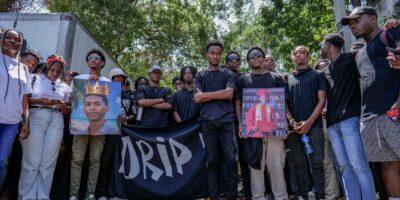Quisqueya University is not ruling out the possibility of closing “temporarily” for lack of money in a context where several leading higher education institutions point to a significant drop in enrollment
In January 2019, the prestigious Quisqueya University had 3,585 students.
In the same period in 2021, this figure fell to 2,204.
But as of November this year, the institution of higher education barely counts 850 learners across its six faculties, an extraordinary drop of more than 76% compared to 2019.
“We are not ruling out the imminent danger of temporarily ending activities due to a problem of revenue sufficient to support the university,” Evenson Calixte, vice-rector for academic affairs at Quisqueya University, reveals to AyiboPost.
Read also : The CCC-uniQ is committed to conserving and restoring the works of Haitian pictorial heritage
The hemorrhage seems to be affecting the entire sector. Leading universities report to AyiboPost a significant drop in enrollment, in a context of mass immigration, the departure of professors abroad due to insecurity, soaring inflation, and the economic crisis.
According to data from the Rectorate of the State University of Haiti (RUEH), the institution’s 21 entities had registered 29,209 enrollees for the 2022-2023 academic year.
For 2023-2024, this figure dropped to 14,486, a decrease of more than 50% for the largest university in Haiti.
If the UEH recorded a slight rebound of 31% in 2022-2023, the downward trend has remained constant for the last four years, according to the RUEH.
“We are witnessing a situation marked by a deep sense of disappointment and concern,” analyzes Jean Poincy, academic vice-rector of UEH, to AyiboPost.
The Henry Christophe de Limonade Campus (CHCL) of the UEH located in Cap-Haitien has 3,014 applicants in total, which contrasts with the 4,000 to 5,000 recorded over the last four years. “This is a reduction,” Evenel Michel, interim dean in the department of educational sciences and head of enrollments, told AyiboPost.
Read also : The scourge of bad grades at UEH
Private institutions are also suffering.
In 2018, the University of Port-au-Prince (UP), established in the capital for 40 years, had around 5,000 registered students.
But now, “we had difficulty retaining a student body of 2,000,” Nancy Durané, head of academic affairs at UP, reveals to AyiboPost.
“Classrooms that previously had 80 to 100 students barely reach 30 today,” according to Durané.
Many of the UP students had to abruptly interrupt their classes during the last session due to the difficult circumstances in the country, according to Durané.
We had difficulty retaining a student body of 2,000
Like their students, universities are also forced to leave certain areas due to insecurity.
This is the case of UNIKA University, previously located on Boulevard 15 Octobre in Tabarre. The structure had to move three months ago to settle in Turgeau.
“This move led to a significant loss of students, forced to abandon classes due to the arduous journey from Tabarre to Turgeau, in an already unfavorable context,” laments Jean-Baptiste Joseph, registration manager at UNIKA.
The educator speaks of 2023 as a “catastrophic year.”
Registrations began in July 2023. “So far, we have not yet reached the mark of 200 registrants across four faculties in total, so we’re not even at a quarter of the usual number of enrollees,” says Joseph.
Read also :Back to school: more than 24 schools transformed into temporary shelters in P-au-P
Beyond economic considerations, the decline in admissions comes with practical consequences for faculties.
In general, the UEH Normal Superior School (ENS) records an average of 3,000 applications. “This year, we are dealing with only 800 candidates in total for the seven departments of the institution,” says Louïs Alvarez, research director at the ENS.
This situation accompanies a drop in the caliber of most admitted students. “We are forced to choose candidates whose academic level is relatively lower,” Dieuseul Predelus, director of financial affairs at ENS, told AyiboPost. “This is why the administration has decided to set up refresher sessions before even starting the academic program.”
We are forced to choose candidates whose academic level is relatively lower
Faced with this situation, the State university finds itself devoid of options.
“We could have considered setting up online courses for students, but this option is unfortunately inaccessible to us due to the lack of adequate resources, inadequate internet connectivity, recurring power outages, and the massive exodus of many professors from the country,” said the academic vice-rector of the UEH, Jean Poincy.
Unsubsidized, a university like Quisqueya operates mainly on tuition paid by students.
According to Evenson Calixte, to keep up, the institution, whose research has saved the “local millet (pitimi),” is setting up online courses, undertaking the relocation of at least one of its faculties and adjusting the payment schedule for students.
But this problem promises to have repercussions on the country in the long term.
“These young people, who should have received solid training to contribute to national development, are leaving in droves,” notes Jean Poincy of the UEH. This reality will create a void, a shortage of talent, and, as a result, it is feared that Haiti will experience considerable difficulty recovering. »
Cover Image : Graduation ceremony at Quisqueya University in 2021. | © ComUniQ
Stay in touch with AyiboPost through :
► Our WhatsApp channel : click here
► Our WhatsApp Community : click here
► Our Telegram canal : click here







Comments